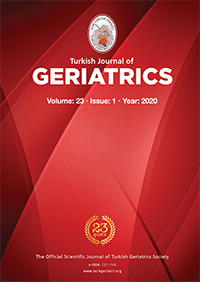2Hacettepe University, Medical School, History of Medicine and Medical Ethics, Ankara, TURKEY DOI : 10.31086/tjgeri.2020.133 Introduction: We aimed to determine what elderly individuals think about good death and their level of anxiety about death in order to guide people and families working with elderly individuals.
Materials and Method: 420 volunteer elderly participated in the study. Questionnaires were conducted using face to face interview technique. The measured values were calculated as arithmetic mean and standard deviation, while values determined by counting as number and percent. The significance of the difference between the means of the groups was evaluated using the T-test for 2-independent samples for two measured values, the One-Way ANOVA test for comparison of three and more measured variables, and the Tukey"s post-hoc test for determining the factor that caused the significance.
Results: The importance given to psychosocial and spiritual aspect, personal control and clinical aspect of death were found to be high in elderly individuals, having a near death experience and having children are factors that increase death anxiety of elderly people. Elderly women have higher death anxiety, and death anxiety decreases with age. It was found that thinking of death frequently increases death anxiety.
Conclusion: As a decent and fair life befitting human dignity is an indispensable right for all people, decisions regarding the last period of life and the desire for a good death are equally indispensable rights for all people and all age groups, and applications in practice should be shaped according to these needs.
Keywords : Aged; Anxiety; Death; Attitude
